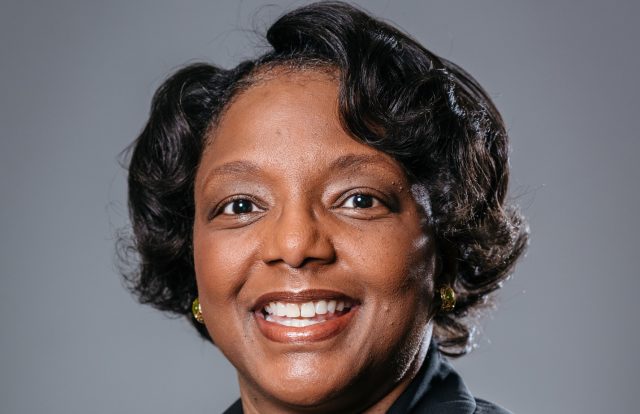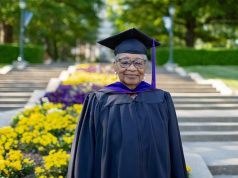By Sym Posey
The Birmingham Times
As a military child, Tondra Loder-Jackson lived in a number of locales including Hawaii; Texas; and Maryland, but no place has been like her hometown of Birmingham, Alabama.
Loder-Jackson, a professor of Educational Foundations in School Education at the University of Alabama- Birmingham (UAB), was raised in raised in the Magic City and attended Gate City Elementary School, W.J. Christian, and Ramsay High School, class of ‘85.
Not only was she educated in Birmingham City Schools but she also became a leading researcher of the city’s educational history.
“Growing up in Birmingham, of course I heard about Dr. Martin Luther King Jr. and his powerful role in the [Civil Right] movement… I knew the role those leading preachers played during the movement. I also knew the role that children played during the movement … a missing link for me was the role that educators played,” she said.
Loder-Jackson began research that would lead to her first book in 2016, “Schoolhouse Activists: African American Educators and the Long Birmingham Civil Rights Movement.” This year, she co-edited, “Schooling the Movement: The Activism of Southern Black Educators from Reconstruction Through the Civil Rights Era,” both detailing the roles of Black educators during the Civil Rights Movement.
Loder- Jackson says she feels like the work of an educator is not transparent enough to the public. Their work is done behind classroom doors.
“People don’t always know our curriculum, they don’t know about our role as mentors, or they don’t know the role we play in supporting families,” she said. “As an educator I wondered if there was a story that we might be missing… I really had a hypothesis that educators were being overlooked because we [as a society] weren’t looking closely at how they might have contributed to the movement through there professionalism.”
Birmingham Educators
For her book on Birmingham teachers, Loder- Jackson reviewed stories that were already archived at the Birmingham Civil Rights Institute, interviewed over 40 different educators from the area and enlisted an undergraduate at UAB to conduct a few interviews “of people who … were younger, African- American male educators.”
Those included people who taught pre-school through 12th grade, higher education, and community educators or people who worked with non-profits that were born prior to the 1950s and who were born after the 1960s.
“I was interested in three generations of educators who were all African Americans,” Loder-Jackson said. “Some of the narratives that I heard when I asked the question what role educators played in the movement and the generally response was, ‘they were not involved in the movement.’”
“What I found out was that there were some Black educators that were on the front lines, like Lucinda Robey. She was a teacher and a principal and a close comrade of Rev. Fred Shuttlesworth who was the only woman whose name was listed on charter of the Alabama Christian Movement for Human Rights. She worked closely with the NAACP’s youth arm. Drawing on her profession as a teacher and leader, I would say transferred into her work as a Civil Rights activist. There was a point where he [ Rev. Shuttleworth] suggested to her that she could be vulnerable to losing her teaching job in which she responded with, she will do what she could do.”
Loder-Jackson said there are other examples of people from other profession, “but we don’t know that they were an educator.”
“People like attorney Arthur Shores,” she said. “He is well known for his Civil Rights and legal activism and representing Autherine Lucy (the first African American student to attend the University of Alabama). Some of his motivation for taking on Black plaintiffs who were involved in education cases was because he was a teacher, administrator, and an active member of Alabama State Teachers Association,” said the professor.
“Fulfillment Of A Mission”
From 1882 until its merger with the whites-only Alabama Education Association in 1969, the largely African American Alabama State Teachers Association (ASTA) served as an important organization for promoting funding for African American education and later advocating for voting rights and the desegregation of public schools.
“If you’re going to be looking at what role Black educators played in the movement, ASTA is an important organization to look at because they didn’t always work as a single person, they often work collectively …,” Loder-Jackson said. “And then there are other teachers who were involved in the movement who are nameless and faceless to many historians because these people attended mass meetings at Sixteenth Street Baptist Church and others … they were there and involved in the planning and being inspiration for the movement.”
Today, Loder -Jackson continues as a pioneer in the field of education at UAB where she helped to establish and formerly directed the UAB Center for Urban Education. She also holds secondary appointments in the UAB College of Arts and Sciences as a professor in the African American Studies Program and the Department of History as well as a senior faculty associate in the Institute for Human Rights.
Her research and teaching interests include urban education, life course perspectives on African American education, and home, school, and community relations. She was named one of Birmingham-Southern College’s 2020 Distinguished Alumni. Loder-Jackson recently fully endowed the Schoolhouse Activist Endowed Award in Education at UAB.
Working in education feels like “a fulfillment of a mission and a calling,” she said. “I’ve always known, even when I left for graduate school … I had a desire to come back to Birmingham. I wanted to invest into the Birmingham City Schools as well as schools in the greater Birmingham area. “
Favorites
Just shy of seven years old, Loder- Jackson, along with her mother, father, and sibling moved to Birmingham.
“I come from a military family, so my early childhood was in a few different places” that included not only Hawaii, but also Texas and Maryland, she said. “I began attending schools in the Honolulu public school systems [from] pre-k through first grade. We moved to Birmingham in the early 70’s, and I begin attending Birmingham City Schools (BSC).”
“I rode the waves of one of the magnet school integration plans. I really felt I was a beneficiary of the Civil Rights movement. I was a beneficiary of some of the fruits of that movement.”
After she graduated from Ramsay, Loder-Jackson enrolled at Birmingham Southern College and graduated in 1989, she moved to Chicago to pursue graduate studies at the University of Chicago, where she ended up living for 13 years.
“I have worked [with a] non-profit. I worked on anti-poverty initiatives and then I started working in an educational foundation that served a Chicago public high school. I worked as a college and career counselor on the south side of Chicago.
After pursuing her Ph.D. at Northwestern University and living in Philadelphia for a year doing post-doctoral studies, Loder- Jackson returned to Birmingham in the early 2000s to continue her involvement in education.
Asked about some of her favorite things, Loder- Jackson replied,
What’s your favorite meal?
“Pan Asian cuisine, especially Thai and sushi: Perhaps related to my early roots in Honolulu, Hawaii.”
Do you have a favorite book?
“A former youth church leader introduced me to Toni Morrison’s “Bluest Eye” when I was 11-years old. I was struck by the 11-year-old Black female protagonist, Pecola Breedlove’s, chilling, clear-eyed, and ultimately, soul-crushing outlook on race, social class, and colorism in America. I can’t imagine my life without an introduction to this “banned” book in my pre-adolescence.”
What kind of music do you enjoy?
“I’d rather go with genres than just one song: I love old-school R & B, jazz, gospel (the old-school mass choir era & spirituals), and really, really old-school hip-hop (1970s through early 1990s).”
What is the proudest moment of your career?
“My proudest and most humbling moment in my career recurs every time my former students convey that I have made a difference their lives.”
Updated at 1:01 p.m. on 12/16/2023 to make edits.




